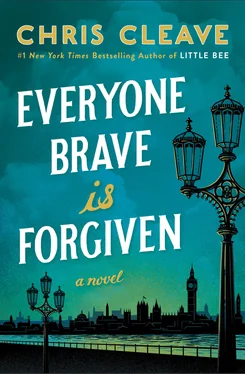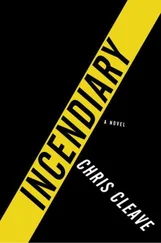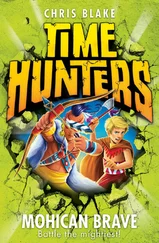“Would you say something to Hilda from me? And to Tom?”
“If you like. I’m sure they’ll understand.”
“You’re a rock.”
She looked up at him sharply. “Alistair, are we cowards?”
Their faces flashed in the frank light of the guns, and he was silent.
—
Back down in the basement someone had lit more candles.
Tom rose when Mary returned. “Are you all right? What happened?”
“He had to go to his regiment. He said to let you know how sorry he is.”
Hilda slumped. “But what took so long?”
“He couldn’t leave until there was a gap in the bombing.”
“He’s mad,” said Tom.
“It isn’t as close as it seems down here. They’re bombing the docks.”
“Perhaps we should all go up,” said Hilda. “One would hate to miss out on the action.”
Mary said nothing.
“I was worried sick,” said Tom. “I’m sorry. I know it’s silly.”
Mary sat down with him. “I was only upstairs.”
“I should have come up, I know. I was just—”
Mary took his hand to show that it didn’t matter. Now that she was back in the basement she began to shake. They waited, down in the dark.
After an hour Mary said, “I don’t suppose there’s any chance of a song?”
Zachary’s father cupped his hands. “Any of my boys awake over there?” Some answering calls came. “Well how about a tune?” he asked them.
There was nothing for a moment, while the sounds of explosions rumbled on. Then a lone, low voice came.
The Lord He thought He’d make a man
These bones going to rise again
More voices joined.
Made him from mud and grains of sand
These bones going to rise again
Zachary’s father joined in, with his eyes closed, and now Zachary too.
The Lord He spoke with monstrous voice
These bones going to rise again
Shook the world down to its joists
These bones going to rise again
The voices rang in the basement. On the bench beside Alistair’s empty place, Hilda glowered at Mary. The city shook. Mary held Tom close and ran her fingers through his hair.
“It will be all right,” she said. “You and I, we will be fine.”
“Yes,” he said.
“And tomorrow we’ll all fix the mess, and on Monday everyone will go to work as usual.”
“I suppose so,” he said.
“What’s the first thing you’ll do on Monday morning?”
“I don’t know,” said Tom. “Inspect all the schools. Check for damage.”
She squeezed his hand. “Good.”
“Then I suppose I will organize repairs as necessary, and check again that the open schools have adequate provision of shelters.”
“That’s good, darling.”
Eve took the needle, Adam took the plow
These bones going to rise again
That’s how we’re all working now
These bones going to rise again
“And what will you do on Monday morning?” said Tom.
“I shall stand in front of my class and tell them none of this palaver is an excuse for not having done one’s homework.”
“You could say that to Zachary now. He might use this time.”
She lowered her voice. “I go easier on him than the others. I think he might have something wrong with him, you know.”
“Beside being the wrong color, you mean?”
She stared until she was sure he was only teasing her, and when he grinned she jabbed him in the ribs. “You dog!”
“So what do you suppose is wrong with him?”
“You’ll scoff, but I’ve researched it and I think he has word blindness.”
Tom groaned. “No such thing.”
“But really. I’ve read papers on it.”
“By crackpots, I’m afraid. Oh, I know you mean well but just think about it. How can one be blind to something that is right there on the page?”
She let her hands fall from his, and sighed. “I don’t know, darling.”
“Right there in front of one,” he said, picking up her hands again and opening her palms like a book. “No farther away than this.”
“They say the eye sees, but there’s a blind place in the mind.”
“And I say it is lack of effort. You must hold him to the same standard as everyone else. Because where should it stop, this fashionable clemency, once we allow that there are things we can see and yet be blind to?”
The singing voices swelled in the cellar and the bombs gave the percussion, and the great injured city went farther into night.
“Oh, I don’t know, darling. I don’t know where it will stop.”
—
Alistair woke in the gray hours. The all-clear was sounding a huge C-sharp across the city. His body found coffee on its own. London created itself in concentric ripples widening from the warm white cup.
Around him were some men of his regiment. Most were in uniform; all were filthy and drawn. A brownish little café. A defeated sort of smell, of wet charcoal and bonfire smoke. No biscuits or buns available. Everyone’s eyes downcast, faces blackened with soot. His watch was in his pocket, inexplicably. Seven in the morning. He put it back on his wrist. His wallet was gone. He thought: They’ve stolen my leave .
He had found his men and stood them drinks in the bars behind Waterloo. Then bombs had fallen near the station and he had organized the men into teams to help the rescue crews. They had used their hands on the piles of brick and timber, digging out civilians and parts of civilians. There had been some competition to see which teams could clear houses the quickest. There had been a grown hand holding an infant hand, with neither attached to anything. There had been an accordion with the Bakelite case blistered and charred. It had helped to be drunk.
Now he made his way to Waterloo Station, where the stationmaster gave him more coffee and let him scrub in the staff washroom. Alistair stripped to the waist and ran a slow trickle of brown water into the basin. The mains pipes were cracked, or the fire pumps were taking all the pressure. He cleaned up as well as he could, combed his hair with his fingers, and accepted a clean shirt that the stationmaster offered. He needed the man’s help to do up the buttons — his fingers were blistered and cut.
He closed his mind to all thoughts of the previous night. This was what he had learned in France: that one could continue to operate quite adequately, so long as one stayed in the hour.
At eight-thirty his men began to arrive back at the station, singly and in lurching groups. Alistair slapped each man on the back and got him roughly corralled at one end of the concourse. It was a relief to be back in charge of something simpler than himself. Though his head was hammering with the hangover, it amused him to discover that the men were worse off. After the rescue work was done it seemed that the majority had simply returned to the public houses, where normal service had continued in the cellars below the bars. It was impressive to see what the regiment had done to itself in twenty-four hours, with only indirect help from the enemy.
“Big night?” he said to a man who was bleeding from a cut above the eye.
“Yes but we’ll give it back to them double, won’t we, sir?”
“The Germans?”
“Well the Navy was fortunate, sir, that the Germans interrupted.”
Alistair docked him two shillings of pay for fighting, wrote him a personal IOU for two shillings, and carried on.
A private was complaining, “If the Luftwaffe had let me have one more hour, I’d have got her in the sack.”
“Look on the bright side,” said Alistair. “If you’d had one more minute after that, you’d have got her in the family way.”
The man turned and saw him. “Sorry, sir, didn’t know it was you.”
Читать дальше












